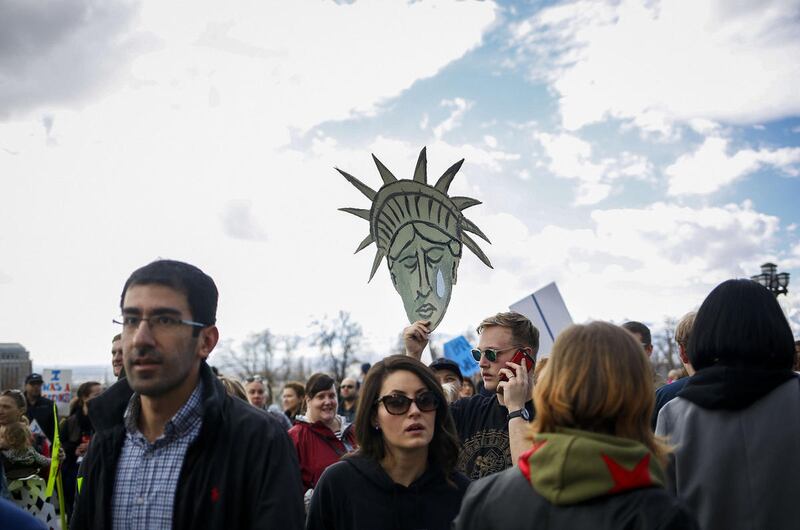SALT LAKE CITY — American Mormons still endure "pernicious consequences" created by U.S. government discrimination against them in the 1800s, says a legal brief filed against President Trump's travel ban in the 9th Circuit Court of Appeals.
The friend-of-the court brief filed by 19 Mormon Studies and history scholars — not all of them Mormon — goes beyond a vivid re-telling of the story of legalized 19th-century anti-Mormonism, which included tidbits that might surprise some members of The Church of Jesus Christ of Latter-day Saints.
The brief warned the court that the president's executive order halting immigration from Muslim-majority countries would legalize anti-Muslim sentiment, and that based on the Mormon experience, which included heavy anti-immigrant sentiment and federal efforts to restrict Mormon immigration, the consequences could last for decades or longer.
The 9th Circuit is scheduled to hear Hawaii v. Trump on May 15. C-SPAN will broadcast the hearing. Trump issued Executive Order 13,780 — "Protecting The Nation From Foreign Terrorist Entry Into The United States" on March 6. The order suspends the entry of people from six countries — Iran, Libya, Somalia, Sudan, Syria, and Yemen — for at least 90 days.
The brief's lead author believes it provides an opportunity for the court to scrutinize the executive order in a way that didn't exist when the U.S. government acted against Mormons.
"We've seen this show before where the government targets religious minorities because the government thinks religion makes them dangerous or different or foreign," said William & Mary law professor Nathan B. Oman.
"The federal government’s sustained 19th-century legal campaign against Mormons," the brief states, "illustrates the dangers of discriminating against religious groups and labeling their members as 'outsiders, not full members of the political community.'"
An influx of Mormon immigrants in the mid-to-late 1800s generated distrust and animosity. One popular pastor said, "Unless we destroy Mormonism, Mormonism will destroy us." Meanwhile, 19th-century racial theorists suggested that Mormonism had given rise to a "physiologically distinct race."
Mormons also were compared to Muslims, "supposedly violent and lustful Turks and Arabs," the brief said. "The church’s founder, Joseph Smith, was derisively referred to as the 'American Mohamet.' In popular books, Mormonism was identified with 'the deepest debauchery, superstition and despotism known to Paganism, Mohammedanism or Medieval Papacy.'"
These attacks on Mormonism made their way into American law. Congress criminalized bigamy in the territories in 1862, excluded Mormons from services on juries, dissolved the church as a legal entity and confiscated its assets and revoked the right of Mormon women to vote. Idaho deprived all Mormons of the right to vote.
In 1879, U.S. Secretary of State William M. Everts issued a ban on Mormon immigration, an incident pointed out by the LDS Dems of America in a statement issued in January after Trump's initial executive order.
"It was wrong then, and it’s wrong now," the LDS Dems statement said.
Everts' letter to European governments asking them to prohibit Mormon emigration from their countries denounced Mormon converts as being from the "ignorant classes" and Mormon missionary efforts as a "criminal enterprise." At one point, a 53-year-old Mormon grandmother was detained with her grandchildren.
Federal officials also pressured Mormon immigrants to abandon their religion and convert to Protestantism. Media coverage included suggestions that Mormons were "un-American" and monolithic.
The impact was lasting, said Oman, whose interest in Mormon legal history was one factor in his decisions to study law and become a law professor.
Mormons continued to suffer from the results of government-sanctioned exclusionary policies in the opening years of the 21st century. For example, the brief pointed out, "in 2007, one in four Americans continued to tell pollsters that they would be less likely to vote for a candidate solely because she was Mormon." Only Islam was viewed with greater suspicion.
The LDS Church released two statements from Joseph Smith about religious pluralism after Trump declared during his campaign that he would ban Muslim immigrants.
Oman said he hoped the brief would be important not only to the court but to Mormons.
"There is a history of targeting Mormons both here and around the world," he said. "If any groups should be concerned about demonizing religious minorities, it should be Latter-day Saints. I hope they recognize the lessons of history and apply those lessons to current events."
Oman and the other scholars prepared a brief in response to Trump's initial order. When he withdrew and replaced it, they reworked the brief and submitted it to the 9th Circuit. The signers are a who's who list of Mormon scholars and experts in Mormon history, including Laurel Thatcher Ulrich, Richard and Claudia Bushman, Terryl Givens and Colleen McDannell.
"Even as a first instance, a Muslim ban under whatever name should alarm those who value freedom of conscience, America's 'first freedom,'" said Kathleen Flake, a professor of religious studies at the University of Virginia in a statement. "But certainly, we should learn from earlier Mormon bans that such discrimination has a long, unhappy cultural life."


